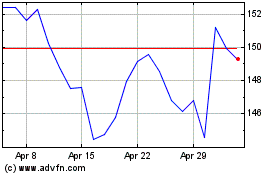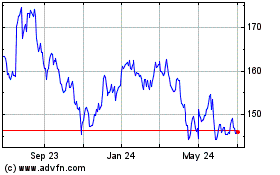J&J Recalls Baby Powder For Asbestos -- WSJ
October 19 2019 - 3:02AM
Dow Jones News
By Peter Loftus
This article is being republished as part of our daily
reproduction of WSJ.com articles that also appeared in the U.S.
print edition of The Wall Street Journal (October 19, 2019).
Johnson & Johnson said it recalled one lot, about 33,000
bottles, of its Johnson's Baby Powder because the U.S. Food and
Drug Administration found a small amount of asbestos in a single
bottle, a discovery likely to fuel existing concerns about the
safety of the famous product.
The health-products company, which is well known among consumers
for its namesake powder, said Friday it is recalling the bottles
out of an abundance of caution despite the low levels of asbestos
reported. J&J said it issued the withdrawal after receiving the
FDA test report Thursday.
The recall comes at a vulnerable time for J&J, which has
been fighting tens of thousands of lawsuits over its talcum powder,
opioid drugs and other products. The stock fell 6.2% in trading on
the New York Stock Exchange.
Admission of an asbestos taint could complicate J&J's
defense against talcum-powder lawsuits in particular, since the
company has been arguing that it hasn't detected asbestos in
decades of testing.
The recall "is a negative for JNJ's reputation and potentially
strengthens the plaintiffs' argument in the ongoing talc lawsuits,"
Wells Fargo analysts said in a research note Friday. The action
probably increases the chances that J&J will settle its
talcum-powder litigation, SVB Leerink analysts said.
J&J faces lawsuits from about 15,500 people in the U.S.
claiming that use of J&J's baby powder and its other
talc-containing products caused ovarian cancer and a rare cancer
known as mesothelioma. Some of the lawsuits allege that asbestos in
the talc products contributed to the cancer because asbestos is a
known carcinogen.
While some of the lawsuits focus on the use of talcum powder
manufactured many years ago, plaintiffs' lawyers say that their
allegations aren't limited to the past and that the ongoing safety
of J&J's talcum powder is an issue in the cases.
J&J says that numerous tests over the past 40 years showed
no asbestos in its baby powder and that its talc products are safe
and don't cause cancer. J&J has won some cases at trial but has
lost some costly verdicts in other talc trials.
"Our talc comes from one of the cleanest mines in the world,"
which tests have shown to be asbestos-free, Susan Nicholson, vice
president of women's health in J&J's medical safety division,
said on a conference call Friday.
Plaintiffs' lawyers say that asbestos was present in J&J's
talcum powder in greater concentrations many decades ago and that
the concentrations dissipated as J&J changed sources for the
mining of talc, a mineral. Yet the lawyers say more recent tests,
including by experts they have hired, have shown trace amounts in
products made since the 1970s. J&J has disputed the validity of
those tests.
Ted Meadows, an attorney with Beasley Allen in Alabama who has
represented plaintiffs in several talcum-powder trials, said the
recall will strengthen his arguments at future trials.
"It's just confirmation of what we've been saying all along," he
said. "It's contra to what J&J has been telling the public and
telling juries across the country."
The recall will undermine J&J's argument in court that tests
have shown its talcum powder to be free of asbestos, said Moshe
Maimon, an attorney with Levy Konigsberg in New Jersey who has
filed lawsuits alleging that inhalation of J&J's talcum powder
caused mesothelioma.
"A federal regulatory body finding a baby powder product still
on the market has asbestos in it is going to bode very badly for
them," Mr. Maimon said.
The New Brunswick, N.J., company said it has a "rigorous testing
standard in place to ensure its cosmetic talc is safe and years of
testing, including the FDA's own testing on prior occasions -- and
as recently as last month -- found no asbestos."
J&J said Friday the latest FDA test indicated the presence
of chrysotile asbestos contamination in well under 1% of the sample
from a single bottle. J&J said the bottle was purchased from an
online retailer, but didn't identify the retailer. It said the lot
was produced and shipped in the U.S. last year.
An FDA spokeswoman declined to comment immediately.
J&J said it is investigating the matter, and at this early
stage it can't confirm whether the sample was taken from a bottle
with an intact seal, or whether the product tested was authentic or
counterfeit.
Write to Peter Loftus at peter.loftus@wsj.com
(END) Dow Jones Newswires
October 19, 2019 02:47 ET (06:47 GMT)
Copyright (c) 2019 Dow Jones & Company, Inc.
Johnson and Johnson (NYSE:JNJ)
Historical Stock Chart
From Mar 2024 to Apr 2024

Johnson and Johnson (NYSE:JNJ)
Historical Stock Chart
From Apr 2023 to Apr 2024
